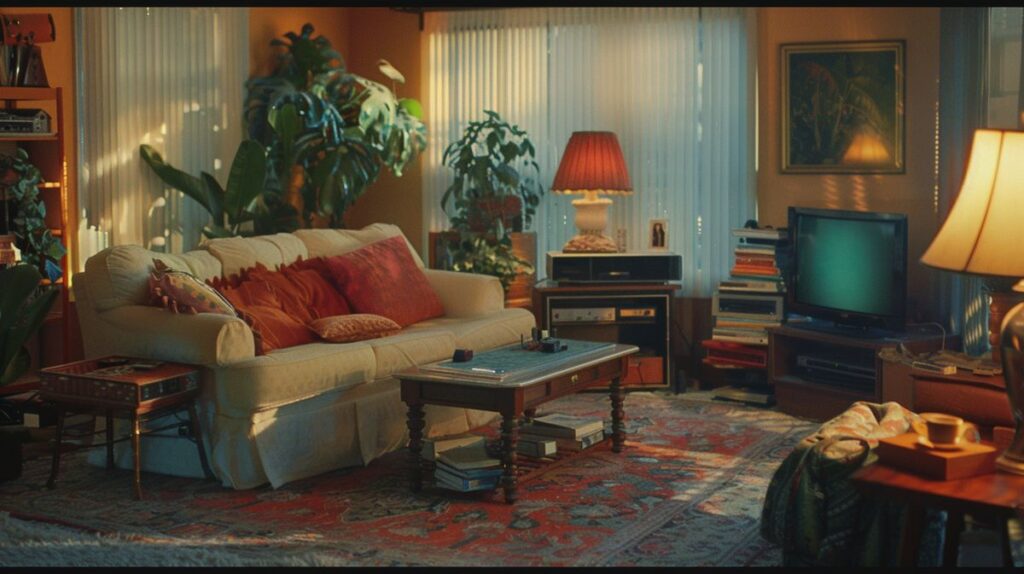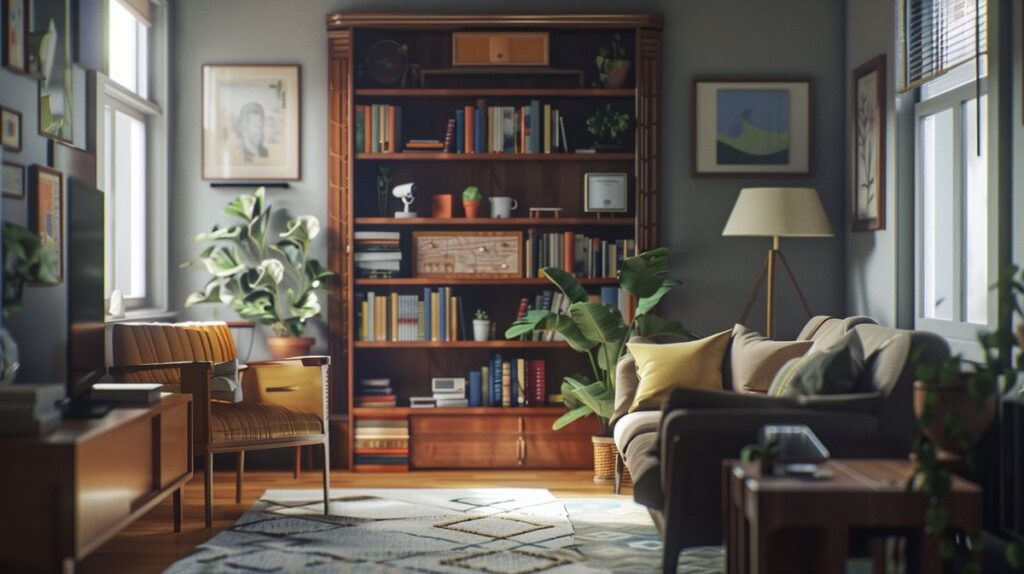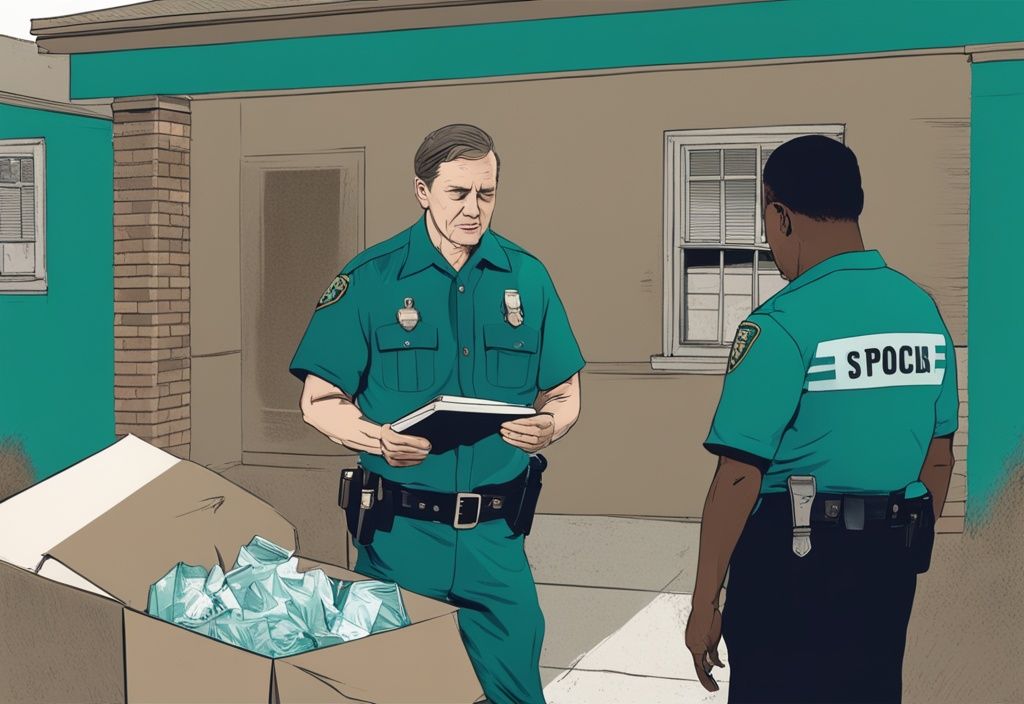Can a Landlord Install Cameras – Know Your Privacy Rights
Ever felt that eerie sensation you’re being watched, only to discover hidden cameras in your rented home? Alarm bells ringing, you’re left questioning, “Can a landlord put cameras in my house without telling me?” Well, let’s delve into that together.
This guide serves as a compass, navigating the intricate labyrinth of audio and video surveillance laws. It’s an effort to demystify your often misunderstood tenant rights and privacy expectations within your living space.
Stick around as we unearth actionable steps if you stumble on unauthorized cameras on your rental property. Knowledge is power – arm yourself, ensuring your privacy remains uncompromised. Here’s to a secure and democratic living environment!
Understanding Your Rights as a Tenant
As a tenant, it’s crucial to know your rights when it comes to privacy and surveillance within your rental property. Let’s dive into the key aspects of what you need to know, especially when confronted with the question: Can a landlord put cameras in the house without telling me?
Privacy Expectations in Rental Properties
Everyone deserves a private space. All tenants are entitled to a reasonable expectation of privacy within their rental unit. Think about it: Would you want someone watching you in your bathroom, bedroom, or living area? Absolutely not. Privacy in these spaces is a fundamental right, protecting the intimate aspects of your life.
Now, let’s address a common concern: landlords installing cameras. Generally, landlords cannot install cameras inside your home without your consent. When you walk into your living room, you should feel safe and respected, not like you’re on a reality TV show. Unauthorized surveillance undermines your personal space and privacy.
The Fourth Amendment and Its Implications
Let’s talk about the big guns—the Fourth Amendment. This part of the U.S. Constitution protects you against unreasonable searches and seizures. But what does this mean for surveillance? It implies that any unwarranted video monitoring by your landlord might violate your constitutional rights.
Think of it this way: secret surveillance by landlords is like someone peeping through your windows without you knowing. It’s a clear invasion of privacy and a potential infringement on your Fourth Amendment rights. Always seek legal advice if you suspect your privacy is being violated.
Legal Regulations Vary by State
Remember, the rules can change depending on where you live. State laws on surveillance can vary significantly, affecting what’s legally permissible in terms of installing cameras.
Both landlords and tenants must be well-informed about state-specific regulations. Staying updated on these laws helps you protect your privacy and ensures landlords can avoid legal pitfalls. Knowledge is power, and being informed is your best defense against unauthorized surveillance.
Legal Framework for Surveillance Cameras
The intricate legal landscape surrounding surveillance cameras varies between federal and state laws, each with specific guidelines and restrictions. Understanding these laws is crucial to answering the question: Can a landlord put cameras in the house without telling me?
Federal and State Laws
Federal Wiretap Act
The Federal Wiretap Act clearly lays down the law: audio recording without all parties’ consent is strictly prohibited. Landlords cannot legally record any wire, oral, or electronic communications without tenant consent. This act emphasizes the tenant’s right to privacy, making any unauthorized eavesdropping not only intrusive but a serious legal violation too.
State-Specific Laws: Examples from Michigan and Florida
State laws reinforce privacy protections. In Michigan, it’s a clear-cut case—recording devices in private areas like bedrooms and bathrooms cannot be installed without consent. Individuals in Florida also enjoy stringent privacy laws that criminalize secret observations in places with a reasonable expectation of privacy. Therefore, if you wonder, Can a landlord put cameras in the house without telling me? state laws in Michigan and Florida resolutely oppose such invasions of privacy.
Audio Recording Regulations
Two-Party Consent States: Massachusetts Example
Massachusetts takes privacy up a notch with its two-party consent requirement. Here, everyone involved in an audio recording must agree to it. This means landlords can’t record conversations unless they’ve got explicit consent from all parties involved. These rules stress the importance of tenant rights, ensuring no sneaky recordings happen within rental properties.
Federal Wiretapping Laws
Federal wiretapping laws are another layer of protection. Using devices intended for eavesdropping or recording conversations without consent is illegal. Breaking these laws can lead to steep fines and even prison time. This federal framework is designed to shield tenants nationwide from unauthorized surveillance by landlords.
By following these legal guidelines, tenants can safeguard their privacy and confidently understand whether their landlord can put cameras in their house without telling them.

Areas Where Cameras Can Be Legally Installed
Common Areas in Rental Properties
Driveways, Hallways, and Entrances
Surveillance in public areas such as driveways, hallways, and entrances is generally permissible. Think of these spaces as bustling train stations where privacy is minimal. So, installing cameras here? Usually not a problem. But here’s the kicker—although it may not be legally required, landlords should still inform tenants about the cameras to maintain transparency and trust. It’s like letting your neighbor know you’re pruning the tree on the property line.
Parking Lots, Stairwells, and Pools
Other common areas like parking lots, stairwells, and pool areas are also suitable for camera installation. Picture these places like the town square—busy, open, and with no reasonable expectation of privacy. Now, while landlords might not have to notify tenants legally, doing so can smooth out any potential wrinkles in the landlord-tenant relationship. Informed tenants are happy tenants, and happy tenants are good tenants, right?
Outdoor Surveillance
Property Boundaries and Window Views
Outdoor surveillance, like cameras at property boundaries, typically gets the green light. These cameras can cover common areas and perimeters without stepping on tenant privacy rights. But remember, no peeking! Landlords must ensure these cameras don’t point directly into tenant windows or capture inside views of rental units. Balancing tenant privacy while securing the property requires some thought. It’s all about the right angles, like finding the perfect spot for a family photo.
Illegal Surveillance Practices
Understanding illegal surveillance practices is crucial to safeguard your privacy at home. These practices include unauthorized use of cameras and recording devices in areas where tenants expect the highest level of privacy.
Invasion of Privacy in Private Areas
Bedrooms and Bathrooms
Surveillance in private areas such as bedrooms and bathrooms without consent is flat-out illegal. These are spaces where you have the highest expectations of privacy. Think about it—would you want someone peeking into your most intimate moments? Unauthorized surveillance in these areas is a clear violation of your privacy rights. With the intimate nature of these locations, any undisclosed monitoring by landlords—involving hidden cameras or any other means—can lead to severe legal repercussions. You simply can’t be too careful.
Unauthorized Audio and Video Recording
Legal Consequences for Landlords
Landlords, beware: Installing cameras without permission, especially those that record audio, can bring about stringent legal penalties. We’re talking substantial fines and possible imprisonment. The law mandates that surveillance must serve only safety and security purposes, never to pry into tenant privacy. Conducting covert surveillance without telling tenants is not just unethical; it’s a gross invasion of privacy rights, culminating in significant legal consequences.
The burning question many tenants have is, “can a landlord put cameras in the house without telling me?“ The answer is an emphatic no.
Invalid YouTube video ID
Any such action without tenant notification is deemed illegal, underlining your right to a private living space free from unwarranted surveillance.
Tenant Actions and Precautions
As a tenant, understanding your rights regarding surveillance within your rental property is crucial. Here’s a comprehensive guide on ensuring your privacy and taking proactive steps if you discover any unauthorized cameras.
Reviewing Lease Agreements
- Thoroughly check your lease for any clauses mentioning surveillance cameras. Landlords may include permissions that could impact your privacy.
- Comprehending these terms helps you spot potential privacy issues early. Being well-informed enables you to address concerns proactively about unauthorized surveillance.
Inspecting Your Rental for Hidden Cameras
Physical Inspection Tips
- Look around for unusual devices, wires, or fixtures, especially in private areas like bedrooms, bathrooms, and living spaces.
- Be wary of common hiding spots like lights, vents, outlets, mirrors, and furniture. Recognizing these spots can help you detect hidden devices effectively.

Scanning for Signals and Lenses
- Use a specialized app on your phone to detect radio frequencies from hidden cameras. These apps can uncover devices that aren’t immediately visible.
- Turn off all lights and use a flashlight to search for reflections from camera lenses. This method can reveal hidden lenses that are discreetly concealed.
Checking for Wi-Fi and Unusual Sounds
- Inspect available Wi-Fi networks for suspicious connections, as some hidden cameras use Wi-Fi. Strange network names can be a giveaway.
- Listen for any odd buzzing or humming sounds that might indicate electronic equipment like hidden cameras operating covertly.
Documenting and Reporting Findings
Taking Photos and Not Interfering
- Don’t tamper with the cameras. Instead, take photos of the device and its surroundings to maintain evidence.
- Keep all findings documented meticulously should the situation escalate to legal proceedings. Proper documentation can be critical.
Contacting Authorities and Legal Advice
- Report your findings to local authorities and consult with a lawyer who specializes in privacy laws. Legal assistance can clarify tenant rights and surveillance regulations.
- Ensure your actions are supported by legal advice and thorough documentation. This strengthens your position and ensures procedural correctness.
This detailed guide on tenant actions and precautions helps renters understand their rights and take steps to protect their privacy. Focusing on the key issue—”can a landlord put cameras in the house without telling me”—it guides tenants through preventive and reactive measures for a secure living environment.
Addressing Privacy Violations
Privacy is a fundamental right, especially in your own home. When a landlord installs cameras without your knowledge, it’s not just unsettling—it’s potentially illegal. Here’s how you can tackle this issue head-on.
Requesting Camera Removal
First things first, approach your landlord directly and ask for the removal of any cameras inside your rental unit. Speak clearly and assertively about your privacy concerns. Reference local and federal laws that protect tenant privacy — it’s your right. Provide solid evidence like photographs or videos of the cameras to back up your request. This isn’t just about asking; it’s about showing that you know your rights.
Consulting a Lawyer
But what if your landlord doesn’t budge? That’s when a specialized lawyer can become your best ally. A lawyer skilled in tenant rights and privacy laws can offer tailored advice and guide you through the legal maze. They can determine if your landlord has broken any privacy laws and explain the next steps. Remember, a well-informed move can make all the difference.
Reporting to Local Authorities
Legal Actions Against Landlords
If all else fails, it’s time to escalate the situation. Contact local authorities to report the privacy violations. This can set legal proceedings in motion. Your landlord could face severe consequences for infringing on your privacy rights. Authorities will guide you through the process and provide much-needed support to ensure your rights are upheld. Taking this step can not only resolve the current issue but also prevent future violations.
Maintaining a Safe and Private Living Environment
Keeping Records of Violations
-
Document Any Suspected or Confirmed Privacy Violations Thoroughly
Imagine finding out that your landlord has installed cameras in your home without telling you. It’s unsettling, right? If you suspect such a breach, start documenting everything meticulously. Take clear photos of unusual devices. Note down the scenes accurately. Think of yourself as a detective, gathering all the breadcrumbs. -
Keep a Log of Dates, Times, and Descriptions of Incidents for Reference
Keeping a detailed log is like building a case. Note the dates and times when you noticed something suspicious. Describe each incident thoroughly. This log will serve as your solid evidence if you need to take the matter to authorities or even court.

Considering Relocation
-
If Trust with the Landlord Is Irreparably Damaged, Consider Moving Out for Your Peace of Mind and Security
Trust is the cornerstone of a tenant-landlord relationship. If it’s shattered because cameras were installed without your knowledge, it might be time to think about moving out. Prioritize your peace of mind and security. Living in constant worry isn’t worth it. -
Ensure You Understand Your Lease Termination Rights and Any Financial Implications
Before packing your bags, ensure you know your lease termination rights. Are there any financial penalties for ending the lease early? Understanding these details will help you navigate the process smoothly. It’s sometimes wise to consult legal advice for clarity.
Conclusion
So, can a landlord put cameras in the house without telling you? The answer is generally no. Let’s break it down:
- Legal Restrictions: Landlords typically can’t install cameras inside a rental unit without notifying tenants. This is a breach of your right to privacy. Imagine waking up one day to discover you’re being monitored without your consent. Frightening, right?
- Tenants’ Right to Privacy: You have the right to a private living space. Unauthorized surveillance not only invades this privacy but also shakes your sense of security. Think how unsettling it would be to realize your every move was being watched.
- Legal Consequences for Landlords: If landlords decide to ignore these laws, they face serious consequences. We’re talking substantial fines and even potential jail time. The Fourth Amendment and various federal and state laws are there to protect you from such privacy violations. It’s like having a sturdy lock on your door, keeping unwelcome intruders out.
- Proactive Measures for Tenants: You need to be proactive in safeguarding your privacy. First, review your lease agreements carefully. Look for any clauses related to surveillance. Next, do a thorough inspection of your space for hidden cameras. And don’t forget to brush up on local laws regarding tenant rights. Knowledge is your best defense.
FAQ: Landlords and Surveillance
Can a landlord put cameras inside my rental without telling me?
No, landlords generally can’t install cameras inside your rental unit without informing you. Doing so violates your privacy rights and could lead to legal consequences. Imagine coming home and feeling watched—that’s not okay.
Are landlords allowed to install cameras in common areas?
Yes, landlords can install cameras in common areas like driveways, hallways, and entrances. Typically, they don’t need to tell tenants, but it’s better when they do. Transparency builds trust, and knowing about surveillance helps everyone feel safe.
What should I do if I find a hidden camera in my rental property?
First, document the camera with photos. Don’t tamper with it. Contact local authorities and a lawyer to understand your options. Your privacy is paramount—no one should breach it.
Is audio recording by landlords legal?
No, audio recording without consent is generally illegal under federal and many state laws. Landlords must have explicit consent to record conversations. Imagine if every chat you had at home was recorded; it’s both unsettling and illegal.
What are the legal consequences for landlords who install unauthorized cameras?
Landlords may face substantial fines, jail time, and legal action, including potential termination of the rental agreement. Unauthorized surveillance is a serious offense. It’s not just about violating tenant privacy—it’s about breaking trust and the law.
I’m James Albright, a home security expert with over 15 years of experience, and I’m passionate about helping families protect what matters most. After serving as a police officer, I transitioned to security consulting to share my hands-on knowledge and practical tips. My mission is to make home security simple and reliable by offering clear, no-nonsense advice and easy-to-follow guides. When I’m not reviewing the latest security tech or writing, I’m out in the community leading neighborhood watch programs and, most importantly, keeping my own family safe.





Post Comment